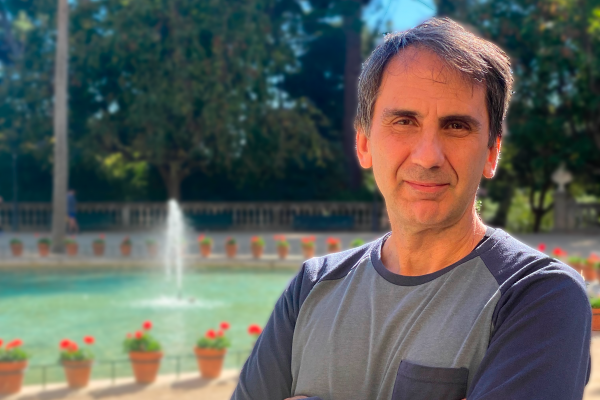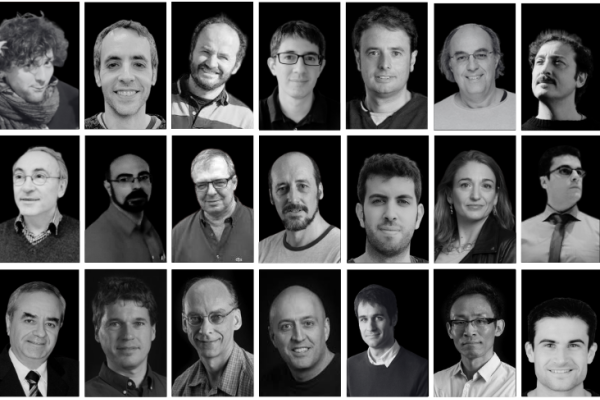The current director of the Institute of Cosmos Sciences of the University of Barcelona, Xavier Luri, has been re-elected to continue his position at the front of the Institution for 4 more years.
We asked Dr. Luri to evaluate his first mandate in an interview with the ICCUB Communications Office, and here are his responses.
What is your assessment of your first term as director of the ICCUB?
It's certainly been a learning curve… management positions may seem obvious, but you do have a lot to learn. One has to get used to the inner workings of the public administration, the University, its internal structure, who does what… You have to make the right contacts, and learn to navigate the public infrastructure. I greatly value all the things I have learnt of our Institution, the University of Barcelona.
We had a bit of a rough start since the first year we did not renew the María de Maeztu Unit of Excellence funding, but we pushed a bit harder and the second year we managed it, which rekindled our activity. I am deeply thankful for the Institute’s collective effort to achieve again the María de Maeztu recognition.
My overall assessment is positive: a lot of effort, learning and science thanks to the work of all the teams and the hard-won funding.
What are the strengths of the current board?
Our biggest strength is that we represent quite transversally the different scientific areas of the Institute (Astrophysics, Nuclear Physics and Particle Physics) with the Director, the Deputy Director and the Secretary. The ICREA community is also represented by the Scientific Director.
Another asset of the current board is that we come from a 4-year-long mandate and I believe that the gained experience enables us to face this second term with clearer goals and ideas from the very beginning.
What about possible weakness?
At the moment, I can think of two main threats to our Institute. The biggest one is, in my opinion, the fact that the structural funding of the Institute of Cosmos Sciences of the UB, and of all the other UB Institutes in fact, is way too small.
As a leading institution and Unit of Excellence, our ambitions and needs are many and at the moment these are can be a reality thanks to non-structural funding, particularly the María de Maeztu, but in a pessimistic scenario where we lacked this external backing, our scientific production and ambitions would be limited by the lack of economic support. The Executive Board can try to circumvent this issue by diversifying the funding sources and increasing the number of projects that we apply to, but we believe that all UB Institutes should have stronger structural funding that enables them to have a stable Secretariat and Technological Unit and properly carry out their regular activities.
Another threat to our Institution is growth. Since 2017, the ICCUB has increased its members in more than 25 people, and I wonder if this gain is sustainable under different perspectives: physical space, administrative burden and scientific support required. In this term, we will consider how and how much growth we can take on to not be a victim of our own success.
Lastly, any new projects on the horizon?
Many! We have applied for the Simons fellowships and the SGRs fellowships and we are strongly encouraging our members to apply to other projects. This last year we welcomed two ERC researchers and we are expecting another one next year. We also want to innovate in our Outreach programs exploring Citizen Science or Arts & Science projects. To sum up, this next term we will try to do more, and we will try to do it better.
About Xavi Luri
PhD in Physics by the University of Barcelona in 1993, X. Luri continued his career at the UB within the field of space missions, especially for the Gaia Mission of the European Space Agency (ESA), of which he was one of the proposers. He is presently associate professor at the Department of Quantum Physics and Astrophysics (FQA), co-PI of the Gaia group at the ICCUB and a member of the Gaia-DPAC (Gaia data processing consortium) executive committee, where he manages the group in charge of the archive development. He has been IP of several projects of the Spanish National Plan dedicated to the development of Gaia data processing and IP of the European project GENIUS FP7, dedicated to the development of tools for the data archive. He has also been a member of the executive board of the Spanish Astronomical Society. Apart from his tasks on research and management, X. Luri is a very active science disseminator and is one of the founders of Big Van company, which groups active scientists working in science dissemination. Since 2013 he is also founder member of DAPCOM SL, a UB and UPC spin-off company, where he participates as a scientific and business advisor.



